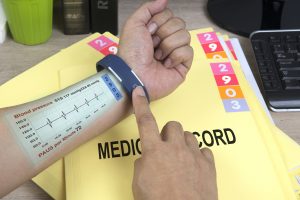It might not be apparent but many facets of our careers have daily-life applications. For instance, when it comes to education and experience in health informatics, professionals sharpen the soft skills needed to relay messages, accomplish projects and prioritize. Those skills carry over into life at home and emerge in personal relationships. Here are six staple concepts of health informatics with plenty of applications outside of the workplace:
Think Outside the Box
Public Health Informatics (PHI) is essentially the joining of two fields. Information/computer science technology and public healthcare merge to create a hybrid discipline.
By taking a step back from whatever scenario you face outside of work, you can uncover solutions that might not have been apparent at the beginning. This dynamic makes health informatics distinctive, as it’s not bound to solely social or behavioral contexts. Rather, public health informatics professionals must consider all vulnerable points leading to disease or injury while taking governmental context into consideration as they come up with innovative healthcare solutions. It’s all about the big picture.
Be Cognizant of Someone Else’s Learning Curve
Many times health informaticists must work within the constraints of physicians’ and nurses’ limitations when it comes to technical prowess. It’s not always the medical professionals’ fault as they often have little time to sift through device manuals or instructions carefully. This helps the informaticists learn patience and understanding, traits that can be applied to personal relationships with those who require extra guidance.
Use Teamwork to Tackle Big Challenges
No one is on an island, particularly in the information technology field, although the work can seem isolated at times. Teamwork is essential to the planning, selection and implementation of clinical decision support (CDS) systems and informatics technology. Healthcare professionals must collaborate with informaticists for innovation and the sharing of best practices.
Communication is paramount in establishing and maintaining relationships, in and out of the workplace. Healthcare informaticists must be well versed in expressing ideas and expectations in order to be successful.
Always Finding a Silver Lining
Sometimes you have to work with what you have instead of what you want or need. In the IT world, things go wrong with regularity. The Ponemon Institute surveyed 577 healthcare professionals on the technological inefficiencies they face daily. Of those surveyed, more than half say the inefficiency of pagers (52%) is the biggest waste of clinician’s time, followed by the lack of Wi-Fi availability (39%) and the inadequacy of email (38%).
It takes a creative mind to find the positives in a sea of negatives. Optimism and creative thinking are essential in problem solving, no matter where you are.
10 Hilarious ICD-10 Codes
Victory Favors the Prepared
Some working in health IT witness emergency medical situations, especially those specializing in emergency medical informatics. The practice of medicine in the emergency department requires the capture of many data and time elements to be effective. Emergency medicine informatics modules support information dealing with patient tracking, nurse and physician charting, order entry, discharge directions and even prescription generation.
Health Informatics professionals need to constantly be ready to react to a crisis. This preparedness forges leaders. It makes them beacons of stability when everything else around them is falling apart. There are parallels between those work events and other major milestones in our personal lives such as childbirth or injuries.
Be the Change You Want to See
In the growing and developing field of health IT, many of the rules are being written now. There are many ways in which skilled professionals are contributing to the policymaking and standardization of the health IT practice, such as the HL7 or TIGER Initiative communities.
Health informatics prepares individuals to be contributing members of society by giving them the tools and confidence to become capable decision makers.
Health informaticists grapple with a wide array of issues as they act as technology problem solvers in the health care industry. The skills they hone and utilize at work have applications outside the job field as most of it is based on communication and prioritizing skills.
Sources-
- http://health-information.advanceweb.com/Columns/Directions-in-Analytics/Collaboration-Pathway-to-Informatics-Innovation.aspxInformatics-Innovation.aspx
- http://www.researchgate.net/publication/238725370_Emergency_Medicine_Informatics_Information_Management_and_Applications_in_the_21_st_Century
- http://www.healthcare-informatics.com/news-item/study-pagers-outdated-communication-tech-costing-hospitals
- http://whqlibdoc.who.int/hq/2010/WHO_HSS_EHT_DIM_10.4_eng.pdf
- /resources/health-informatics/public-health-informatics/




